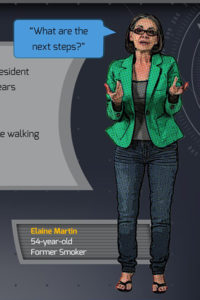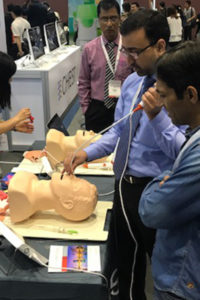
People are busy, and they have little time. It’s becoming increasingly important in medical education to deliver content in bite-sized pieces because learners’ attention spans are shorter and divided across so many things, said Robb Rabito, CHCP, Senior Director of Program Development at CHEST.
“Our mantra here at CHEST is ‘micro moments,’” Rabito said. “Micro as in hand-held on your phone, and micro as in time and attention span. Gamification is the perfect way to educate in bite-sized pieces.”
CHEST’s innovative Games (Games Augmenting Medical Education) deliver education about diseases of the chest in a fun, interactive way that tests competency. You can play the CHEST Games in the Exhibit Hall.
Most of the CHEST Games are digital and case-based, where players are tasked with answering questions and making decisions about the best diagnosis, procedures, or treatments prescribed as they walk through a patient case. The developers have found a way to gamify it, for example, setting a limited amount of time in which they can answer questions.
CHEST has built a portfolio of these games over the year, which turns into an arcade at the annual meeting. Some of the original ones are still there, like Aspirated! and COPD Whack-A-Doc, but a few new ones are making their debut this year, including a pulmonary knowledge escape room with a science fiction theme and two new virtual reality experiences.
 “Learners will put on virtual reality glasses and enter the cellular world where they will identify the different triggers and pathways related to severe asthma,” Rabito said. “There’s a lot of new treatments and new research being done in that area. We also will have a virtual classroom experience, too, where participants will put on glasses and will participate in a virtual classroom with an instructor, learning strategies, and procedures for handling laryngoscopy.”
“Learners will put on virtual reality glasses and enter the cellular world where they will identify the different triggers and pathways related to severe asthma,” Rabito said. “There’s a lot of new treatments and new research being done in that area. We also will have a virtual classroom experience, too, where participants will put on glasses and will participate in a virtual classroom with an instructor, learning strategies, and procedures for handling laryngoscopy.”
In the escape room, clinicians will have to solve several medical mysteries in order to escape. If they do it successfully, they’ll be beamed out like they do in Star Trek.
Not all of the gamification at CHEST is in the form of an actual “arcade” game. CHEST is introducing “pop-up simulation” this year, where CHEST 2019 Program Chair William Kelly, MD, FCCP, and other faculty might surprise attendees coming out of a session with a spontaneous simulation challenge. Of course for many years, CHEST has delivered its original gamified activity—the annual CHEST Challenge Jeopardy!-style game for fellows.
CHEST staff member Chad Jackson and Dr. Kelly prototyped many of the CHEST games developed over the years. Now CHEST has a whole development team who works on the games in conjunction including e-learning specialists who have advanced experience in instructional design and biomedical visualization. They work in conjunction with teams across CHEST to create new gamified educational experiences.
 Here’s a list of this year’s CHEST Games:
Here’s a list of this year’s CHEST Games:
Aspirated!
In this game, a standardized foreign body is dropped into a low-fidelity simulator by a CHEST staff member who then keeps time. After a brief introductory video from an expert “coach,” the player has up to seven minutes to find and remove the foreign body using flexible bronchoscopy. Subsequent players then try to bump their competitors off of the leaderboard with faster and faster times.
Echo Eddy
This activity is a new medium-fidelity simulator designed to provide you with basic and moderately advanced echocardiography case-based content in an interactive patient-based format. Here, you’ll use a simulated ultrasound probe to scan the patient, see the echocardiogram, and answer corresponding questions to the case.
Nodal Nemesis
Interactive, team-based game to be offered at scheduled times throughout CHEST 2019. In this game, teams of three participants on each of two sides will identify their given image of a white scope bronchoscopy image, a CT image, or an EBUS image of a particular airway node. Then they will race against their competitors to drive robots to the proper place on a giant Airway Nodal Anatomy Map before their competitors are able to do so.
Supported through a partnership with Medtronic, Inc.
PAH Jeopardy
PAH Jeopardy is a computer game adoption of the popular game show Jeopardy! where you can test your knowledge of pulmonary arterial hypertension. If the player does not achieve a score of 70%, they are given the option to retry.
Peer Pressure
Peer Pressure is a game that can accommodate up to 30 players at a time. Players answer questions that grow increasingly more complex. Players who answer questions incorrectly are eliminated until one player is left standing. Questions will be based on the content of the sessions that make up the Infections Learning Track. This game will be offered numerous times throughout the annual meeting.
PHINGO
In PHINGO, the player plays a game similar to bingo. The player is presented with a card that has 25 squares, which include a current or emerging treatment approach for pulmonary hypertension. Players get PHINGO when they have five vertical or horizontal spaces filled in a row on their card.
Choose Your Own Pulmonary Adventures
There are two versions of this exciting game. Each consists of several real “unknown” cases representing common or life-threatening scenarios that patients present with to the pulmonologist. First, an image is displayed (chest radiograph, CT scan, or both). The player may then select to receive the patient history and/or get advice from a chest radiologist at that time or move on. Additional information is then provided. Ultimately, players must select the “next best step” in diagnosis or management.
COPD Whack-a-Doc
Under time pressure, players are presented with three “facts” about COPD diagnosis and/or management. They must “whack” (select) the wrong one. If they do not, or if they do not do so within the time allotted, an alarm sounds and they must try again. After each question, there are explanatory slides to reinforce the critical teaching points.
Air Diver
In this CHEST Game, Learners will be presented with six animated patient case vignettes surrounding the identification, diagnosis, and treatment of severe asthma. Learners will be asked to decide on the best next step for each case through multiple choice questions. Learners will earn points for each correct answer for the chance to top the leaderboard in this interactive game.
Support generously provided through a partnership with AstraZeneca Pharmaceuticals LP.
You Snooze, You Win!
(Sleep Study Game)
Come try our new Game You Snooze, You Win! In this exciting game played on your back, you will navigate your physician avatar through REM sleep, while answering questions to earn points.
How Low Is Your Flow?
This interactive CHEST Game was created to gauge participants actual effort in a variety of inhaler devices. The game will address barriers and misconceptions related to inspiratory flow and the important differences in respiratory device delivery methods. The premise of the game is that learners will follow a series of on-screen cases to answer multiple choice questions using the simulated device. Learners will use a disposable mouthpiece. They will be prompted to take a varying amount of breaths at different effort levels, which will be displayed on the simulated device. Those varying levels of effort will be shown to compare to patient efforts with various disease processes, and also contrasted with the effort to engage various inhaler devices. This will give the learner a depth and breadth of experience as to what the patient has to endure to take their prescribed medications, and how different devices may be more appropriate for different patients.
There will also be seven new CHEST Games at the meeting this year:
New! VR Inflammatory Realms: A Pulmonary Journey
(Asthma Pathway Game)
CHEST created an engaging and innovative game for the multidisciplinary team working with patients who have allergic and nonallergic moderate to severe asthma by helping health care professionals understand the cellular immunology and pathways. This game profiles the characteristics of moderate and severe asthma cellular immunology and pathways. Inflammatory Realms: A Pulmonary Journey includes both interactive virtual reality (VR) and touchscreen activities. The VR activity will transport participants into different inflammatory realms meant to highlight specific biomarkers of type 2 and non-type 2 inflammation (ie, targets of newer biologic therapies). Within these realms, participants will be accompanied by a key opinion leader (expert in asthma care) who will serve as a guide on their journey.
Developed by the American College of Chest Physicians in partnership with Genentech, Novartis and Sanofi-Regeneron.
New! VR Video Laryngoscopy
The Video Laryngoscopy Virtual Reality (VR) Training Pilot is an immersive learning experiment where you can review the key elements of video laryngoscopy using hyperangulated laryngoscope blades in the VR classroom. In this VR experience, learners can proceed at their own pace, interact with a high-fidelity 3D model to understand the spatial relationship of anatomy associated with video laryngoscopy, and view videos and other media that will reinforce key concepts and techniques.
New! Dr. Neb
Play Dr. Neb and put your skills as a pulmonologist to the test by building relationships with patients with COPD and helping make difficult long-term care treatment choices. This game spans four scenarios in two patients. It is recommended that these scenarios are played in sequence.
Supported by an unrestricted educational grant from Mylan NV and Theravance Biopharma, Inc.
New! Pulmonary Fibrosis Jumper
Test your knowledge of Pulmonary Fibrosis in this action-packed “jump” game. Compete for the highest score to be at the top of the leaderboard!
New! Escape Room
Exercise your knowledge, problem-solving skills, and imagination at the CHEST Escape Room. Solve puzzles with your specialized medical team before time runs out to escape from a starship under attack, and save your extraterrestrial allies from certain doom!
New! Game of Nodules
Description: Bring your sword of knowledge to the fight in the interactive Game of Nodules, where you will face multiple levels of challenging questions on the management of patients diagnosed with lung nodules. Topics range from recent guidelines and diagnosis to follow-up and management of patients diagnosed with lung nodules. Be quick and accurate in your answer selections, as the player with the highest score attained in the least amount of time will claim the throne in Game of Nodules!
New! Pop-Up-Sim
Help! I can’t breathe!
Simulation education abounds at CHEST 2019. In addition to formal sessions in the CHEST 2019 Simulation Center, brief simulated medical emergencies may happen at any moment in the hallways of the convention center. Step up and help save this person’s life!





